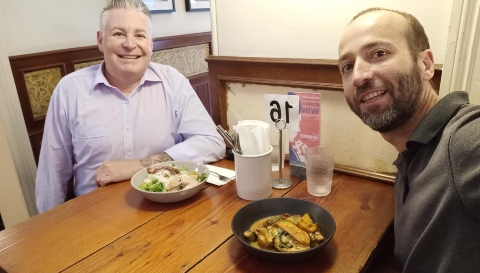Sometimes, we can become so accustomed to the path we’re on that we forget how different things might have been if we’d made just one different choice years earlier.
Jean-Claude Camelin, the 303rd person I’ve met on my quest to have 500 lunches, has found himself at several crossroads during his life.
Growing up, JC worked in his family’s French restaurant, where he did everything from cooking to cleaning. When his parents decided to retire, he had the chance to take over the business at age 16 – but although the idea was appealing, he declined because he’d seen his parents work themselves into the ground. It was only years later, when he had more life experience, that he realised he could have avoided burnout by better understanding how to manage the business more effectively.
At another point in JC’s life, he was attracting a lot of admiration and even media interest in the custom motorbikes he was building as a hobby. That made him seriously consider whether he should turn it into a full-time business. In the end, he ruled out the idea, in part because he was doing well in his career.
JC’s career has also taken him in different directions, thanks to his willingness to embrace new experiences. Today, he works as procurement operations manager for Ausgrid. But he could’ve ended up in a very different place.
He began in the electronics industry, first in production and then, unexpectedly, in procurement. Later, he worked as a management consultant for EY and a fleet manager for Veolia, both of which could’ve been excellent career paths. But he eventually transitioned back to procurement, with Holcim, and has gone on to build an excellent career in that field.
JC is multi-skilled – he’s got a sharp brain, he’s got strong people skills, he’s a skilled communicator and he’s very good with his hands. So he could’ve wound up anywhere.
Sometimes, I like to look back 10 years and think about how much my life has changed and how much I’ve evolved during that time. It’s a reminder that, 10 years from now, none of us can imagine where we’ll be, or how the choices we make today will shape our future.







It was great to catch up with you too Nick 🙂